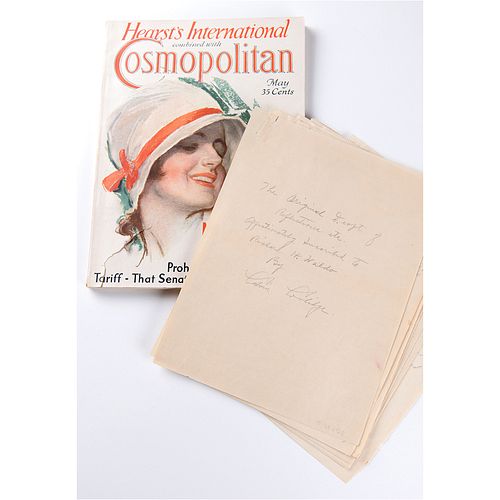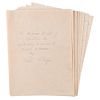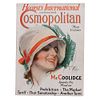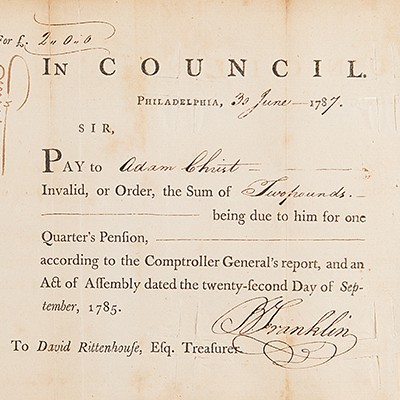Calvin Coolidge Autograph Manuscript Signed for "Reflections from Private Life" - "I should like to be known as a former President who tries to mind h
Two ways to bid:
- Leave a max absentee bid and the platform will bid on your behalf up to your maximum bid during the live auction.
- Bid live during the auction and your bids will be submitted real-time to the auctioneer.
Bid Increments
| Price | Bid Increment |
|---|---|
| $0 | $5 |
| $50 | $10 |
| $200 | $25 |
| $500 | $50 |
About Auction
Jan 10, 2024
RR Auction support@rrauction.com
- Lot Description
AMS in pencil, signed and inscribed on the cover sheet, "The Original Draft of Reflections, etc., Affectionately Inscribed to Richard H. Waldo By Calvin Coolidge," totaling 23 pages, no date but circa May 1930. Coolidge's handwritten draft for "Reflections from Private Life," as published in Hearst's International Combined with Cosmopolitan Magazine, May 1930; an original copy of the complete magazine is included. Reflecting on American life and policy upon his retirement from the presidency, Coolidge comments on prohibition, the market, tariffs, and the possibility of another term. In part: "When I left the White House a year ago my main desire was to get home where I hoped again to have the enjoyments of private life...Although I was in excellent health, and felt greatly relieved at my freedom from governmental responsibilities, I found I was both physically and mentally considerably exhausted." He discusses drafting his autobiography and his disinclination to comment on public affairs: "When I left Washington it was because I believed my work in government service was done. I decided to withdraw from it entirely...I have no special knowledge of the facts concerning most current events, which would enable me with any degree of certainty to discuss them. I have been unwilling, therefore, in these early days of my retirement to give interviews, make speeches, or write extensively about them because I wished to avoid being an officious intermeddler."
Coolidge goes on to assert that he has no desire to return to public office: "In the companionship of my house, with my fish pole, my dogs, my books and my friends, I find I am extremely content...When I left Washington I left public office. It is an incomprehensible relief and I have no intention of returning to it." Commenting on his own presidency and the election of Herbert Hoover, he writes: "I sought to provide a period of tranquility, certainty, and economy, under which the Country could recover from the exhaustion of the world war...the people turned to an efficiency engineer who is thoroughly equipped to guide them in such a movement."
Discussing the dilemma of Prohibition, Coolidge observes: "So long as the human appetite for stimulants on one side, and for money on the other side, remain what they are, there are likely to be some violations of a prohibition law...It seems to me the Country can get considerable assistance by recalling the attitude of Lincoln in all his discussion of the slavery issue...[he] did not recognize any abuse so great, not even human slavery, that he was willing to try to remedy it by a violation of the law of the land...we have a well defined constitutional method of changing our statutes and our fundamental law...so long as the Constitution and the laws remain, the duty of all people [is] to observe them in good faith."
Following a lengthy discussion of the tariff, he concludes: "It provides us with indispensable safeguards to liberty and security which it would be unwise to sacrifice for the sake of expedition." In closing, 'Silent Cal' reiterates his opening paragraphs: "I should like to be known as a former President who tries to mind his own business." In overall fine condition.
Provenance: The Forbes Collection of American Historical Documents, Christie's, October 9, 2002. - Shipping Info
-
Bidder is liable for shipping and handling and providing accurate information as to shipping or delivery locations and arranging for such. RR Auction is unable to combine purchases from other auctions or affiliates into one package for shipping purposes. Lots won will be shipped in a commercially reasonable time after payment in good funds for the merchandise and the shipping fees are received or credit extended, except when third-party shipment occurs. Bidder agrees that service and handling charges related to shipping items which are not pre-paid may be charged to a credit card on file with RR Auction. Successful international Bidders shall provide written shipping instructions, including specified Customs declarations, to RR Auction for any lots to be delivered outside of the United States. NOTE: Declaration value shall be the item’(s) hammer price and RR Auction shall use the correct harmonized code for the lot. Domestic Bidders on lots designated for third-party shipment must designate the common carrier, accept risk of loss, and prepay shipping costs.
-
- Buyer's Premium



 EUR
EUR CAD
CAD AUD
AUD GBP
GBP MXN
MXN HKD
HKD CNY
CNY MYR
MYR SEK
SEK SGD
SGD CHF
CHF THB
THB





